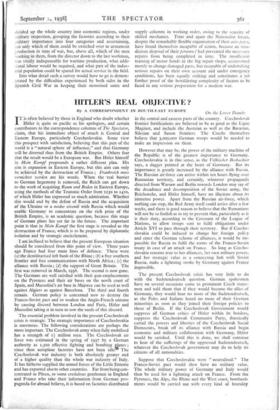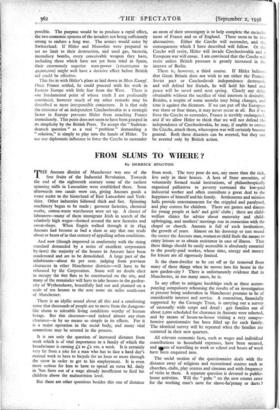HITLER'S REAL OBJECTIVE ?
By A CORRESPONDENT IN SOUTH-EAST EUROPE
On the Lower Danube Iis often believed by those in England who doubt whether 1_ Hitler is quite so pacific as his apologists, and certain contributors to the correspondence columns of The Spectator, claim, that his immediate object of attack is Central and Eastern Europe, particularly Czechoslovakia. Some view this phispect with satisfaction, believing that this part of the world is a "natural sphere of influence," and that•Germany will be diverted thus from the British Empire. Others fear that the result would be a European war. -But Hitler himself in Mein Kampf propounds a rather different plan. His aim is expansion in Eastern Europe, but this aim can only be achieved by the destruction of France ; Frankreich muss vernichtet werden are his words. When the .real barrier to German hegemony is removed, the Reich can get down to the work of acquiring Raum und Boden in Eastern Europe, using the methods of the Teutonic Order from az3o to 1410, of which Hitler has expressed so much admiration. Whether this would end by the defeat of Russia and the acquisition of the-Ukraine or a modus vivendi with Russia which would enable Germany to concentrate on the rich prize of the British 'Empire, is an academic question, because this stage of German plans lies yet far in the future. The important point is that in Mein Kampf the first stage is revealed as the destruction of France, which is to be prepared by diplomatic isolation and by strategic encirclement.
I antinclined to believe that the present European situation shoulC1 be considered from this point of view. Three years ago France had four' main lines of defence. These were (a) the demilitarised left bank of the Rhine ; (b) a free southern frontier'and free communications with North Africa; (c) the alliance with Russia; (d) the support of Great Britain. The first was removed in March, 1936. The second is now gone. The Germans are well satisfied with their gun-emplacements on the Pyrenees and their air bases on the north coast of Spain, and Mussolini's air base in Majorca can be used as well against Algiers as against Barcelona. The third and fourth remain. German policy is concerned now to destroy the Franco-Soviet pact and to weaken the Anglo-French entente by causing discord between London and Paris, Hitler and Mussolini taking it in turn to sow the seeds of this discord.
The essential problem involved in the present Czechoslovak crisis is strategic. The strategic importance of Czechoslovakia is enormous. The following considerations are perhaps the more important. The Czechoslovak army when fully mobilised has a strength of II million men. The Czechoslovak air force was estimated in the spring of 1937 by a German authority as 1,500 effective fighting and bombing planes ; since then aeroplane factories have not been idle. The Czechoslovak war industry is both absolutely greater and of a higher quality than the whole war industry of Italy. It has hitherto supplied the armed forces of the Little Entente and has exported also to other countries. Far from being con- centrated in Pilsen, as some credulous gentlemen in England and France who take their information from German pro- paganda for. abroad believe, it is based on factories distributed in the central and eastern parts of the country. Czechoslovak frontier fortifications are believed to be as good as the Ligne Maginot, and include the Austrian as well as the Bavarian, Silesian and Saxon frontiers. The Czechs themselves believe that 3,000,000 German troops would be needed to make an impression on them.
However that may be, the power of the military machine of the Republic is of the greatest importance to Germany. Czechoslovakia is in this sense, as the Volkischer Beobachter says, a dagger pointed at the heart of Germany. But its importance is greatly increased by the alliance with Russia. The Russian air-force can arrive within ten hours flying over Rumanian territory, and certainly, whatever propaganda directed from Warsaw and Berlin towards London may say of the decadence and decomposition of the Soviet army, the Reichswehr, and Hitler himself, have no illusions about its immense power. Apart from the Russian air-force, which nothing can stop, the Red Army itself could arrive after a few weeks, and there is, good reason to believe that the Rumanians will not be so foolish as to try to prevent that, particularly as it is their duty, according to the Covenant of the League of Nations, to allow troops sent to fulfil obligations under Article XVI to pass through their territory. But if Czecho- slovakia could be induced to change her foreign policy and enter the German scheme of alliances, it would be im- possible for Russia to fulfil the terms of the Franco-Soviet treaty in case of an attack on France. So long as Czecho- slovakia remains true to her alliances, her own military power, and her strategic value as a connecting link with Soviet Russia, make a lightning stroke by Germany against France impossible.
The present Czechoslovak crisis has very little to do with the Sudetendeutsch question. German spokesmen have on several occasions come to prominent Czech states- men and told them that if they would become the allies of Germany, they would hear no more of the Sudetendeutsch, as the Poles and Italians heard no more of their German minorities as soon as they joined their foreign policies to those of Berlin. If the Czechoslovak Government would suppress all German critics of Hitler within its borders, suppress the Czechoslovak Communist Party, drastically curtail the powers and liberties of the Czechoslovak Social Democrats, break off its alliance with Russia and begin economic and military collaboration with Germany, Hitler would be satisfied. Until this is done, we shall continue to hear of the sufferings of the oppressed Sudetendeutsch, whatever the Czechoslovak government may do to help its citizens of all nationalities.
Suppose that Czechoslovakia were " neutralised." The Franco-Soviet pact would then have no military value. The whole military power of Germany and Italy would then be used for a lightning attack on France. From 'the Pyrenees, the Alps, the Rhine and the West coast, bombard- ments would be carried out with every kind of brutality possible. The purpose would be to produce a rapid effect, the two economic systems of the invaders not being sufficiently strong to endure a long war. The armies would enter by Switzerland. If Hitler and Mussolini were prepared to set no limit to their destruction, and used gas, bacteria, incendiary bombs, every conceivable weapon they have, including those which have not yet been tried in Spain, their enormously superior man-power (1 io,000,000 to 40,000,000) might well have a decisive effect before British aid could be effective.
This fits in with Hitler's plans as laid down in Mein Kampf. Once France settled, he could proceed with his work in Eastern Europe with little fear from the West. There is one fundamental point of whose truth I am profoundly convinced, however much of my other remarks may be described as mere irresponsible conjecture. It is that only the existence of an independent Czechoslovakia as a strategic factor in Europe prevents Hitler from attacking France immediately. This point does not seem to have been grasped in its simplicity by the British Press. To accept the " Sudeten- deutsch question " as a real " problem " demanding a " solution," is simply to play into the hands of Hitler. To use our diplomatic influence to force the Czechs to surrender an atom of their sovereignty is to help complete the encircle- ment of France and so of England. There seem to be two alternatives. Either the Czechs will surrender, and the consequences which I have described will follow. Or the Czechs will resist, Hitler will invade Czechoslovakia and a European war will ensue. I am convinced that the Czechs will resist unless British pressure is greatly increased in the interest of Berlin.
There is, however, a third course. If Hitler believes that Great Britain does not wish to see either the Franco- Soviet pact or Czechoslovak independence destroyed, and will defend her friends, he will hold his hand and peace will be saved until next spring. Clearly any delay obtainable without the sacrifice of vital interests is desirable. Besides, a respite of some months may bring changes, and time is against the dictators. If we can put off the European war three or four times, it may never occur at all. But if we force the Czechs to surrender, France is terribly endangered, . and if we allow Hitler to think that we will not defend the independence of Czechoslovakia, he may, if unable to coerce the Czechs, attack them, whereupon war will certainly become general. Both these disasters can be averted, but they can be averted only by British action.







































 Previous page
Previous page